Common Misconceptions about Human Resource Management (HRM)
VerifiedAdded on 2023/01/20
|7
|1495
|70
AI Summary
This article discusses common misconceptions about Human Resource Management (HRM), including the reasons behind these misconceptions and the actual roles and responsibilities of HRM.
Contribute Materials
Your contribution can guide someone’s learning journey. Share your
documents today.
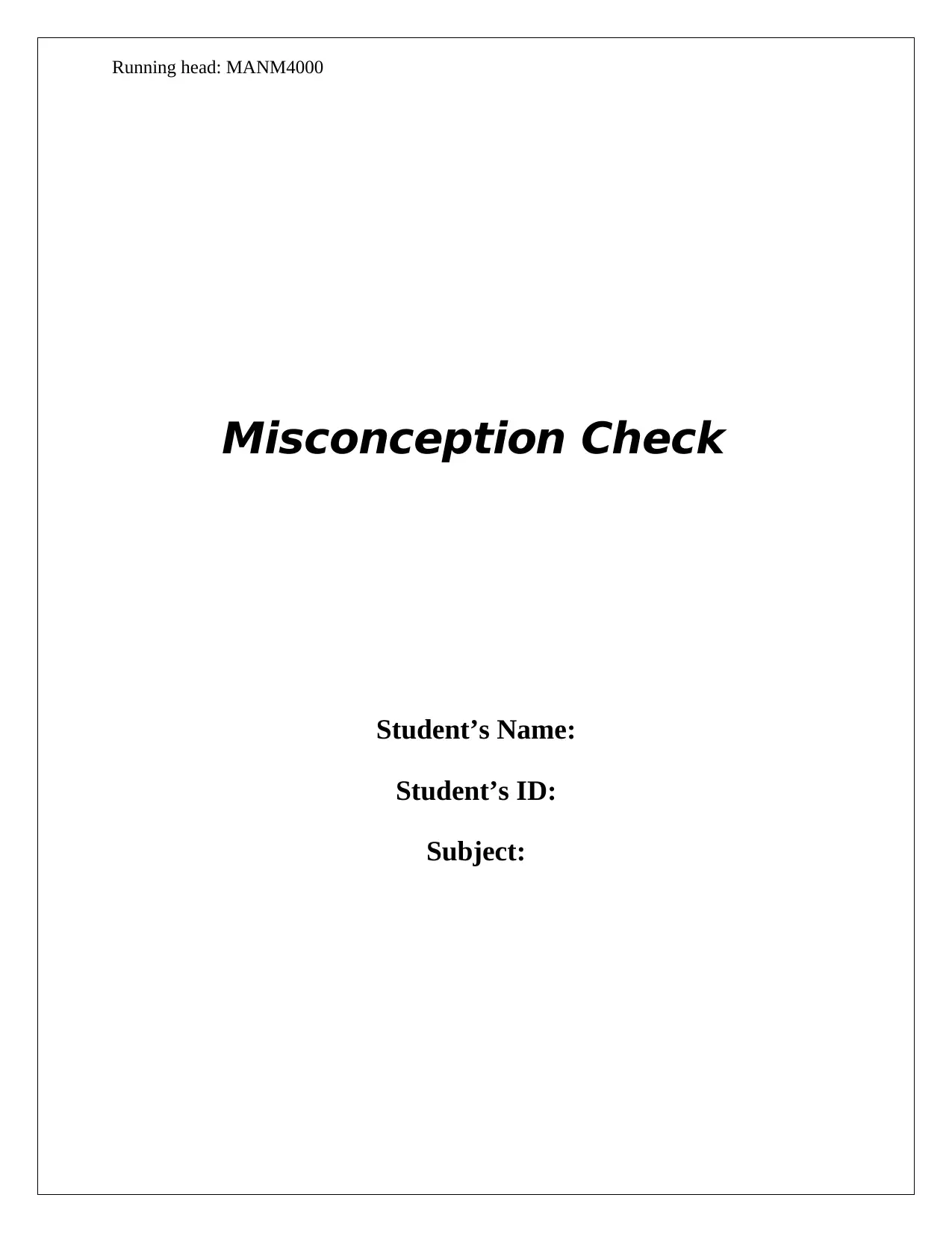
Running head: MANM4000
Misconception Check
Student’s Name:
Student’s ID:
Subject:
Misconception Check
Student’s Name:
Student’s ID:
Subject:
Secure Best Marks with AI Grader
Need help grading? Try our AI Grader for instant feedback on your assignments.
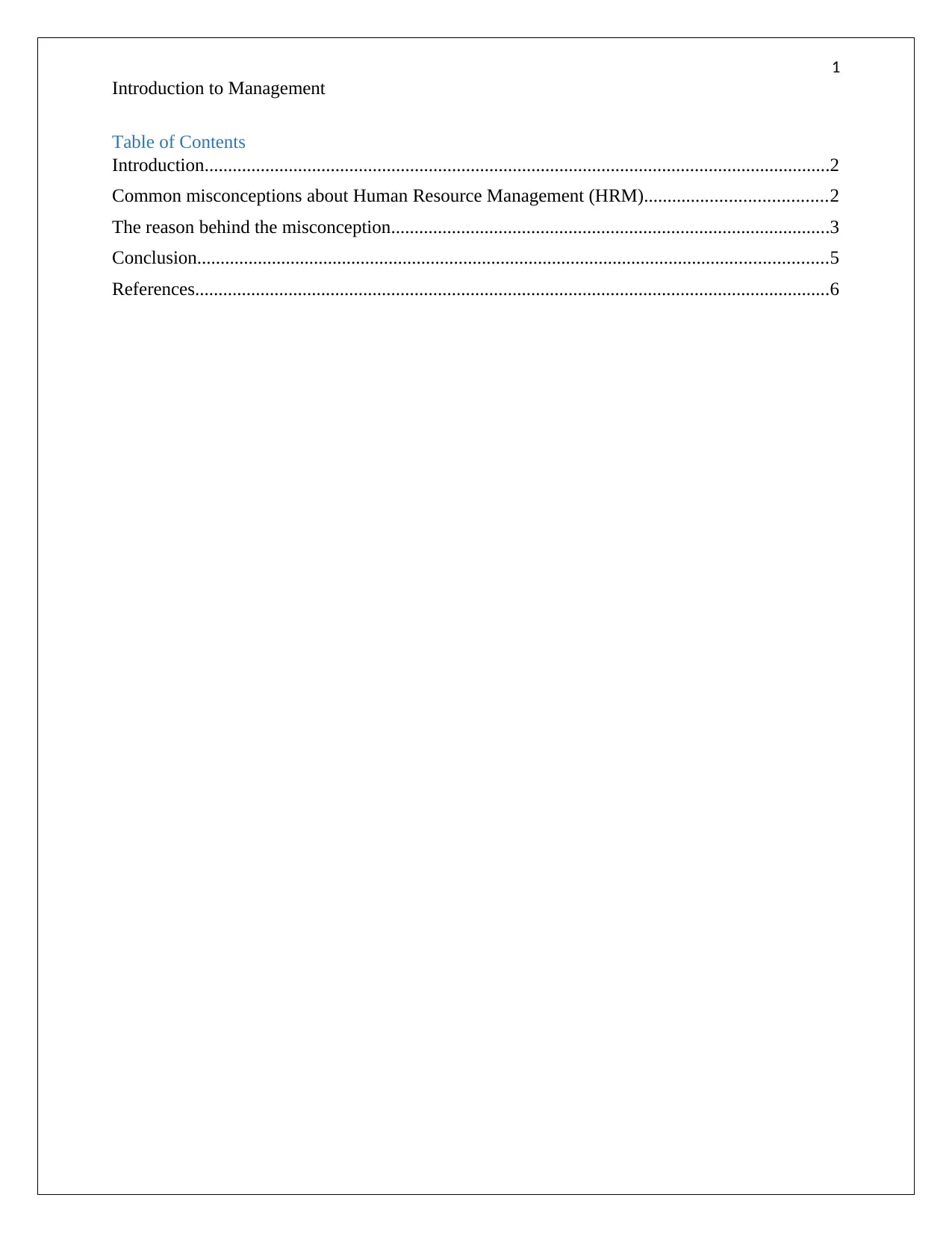
1
Introduction to Management
Table of Contents
Introduction......................................................................................................................................2
Common misconceptions about Human Resource Management (HRM).......................................2
The reason behind the misconception..............................................................................................3
Conclusion.......................................................................................................................................5
References........................................................................................................................................6
Introduction to Management
Table of Contents
Introduction......................................................................................................................................2
Common misconceptions about Human Resource Management (HRM).......................................2
The reason behind the misconception..............................................................................................3
Conclusion.......................................................................................................................................5
References........................................................................................................................................6
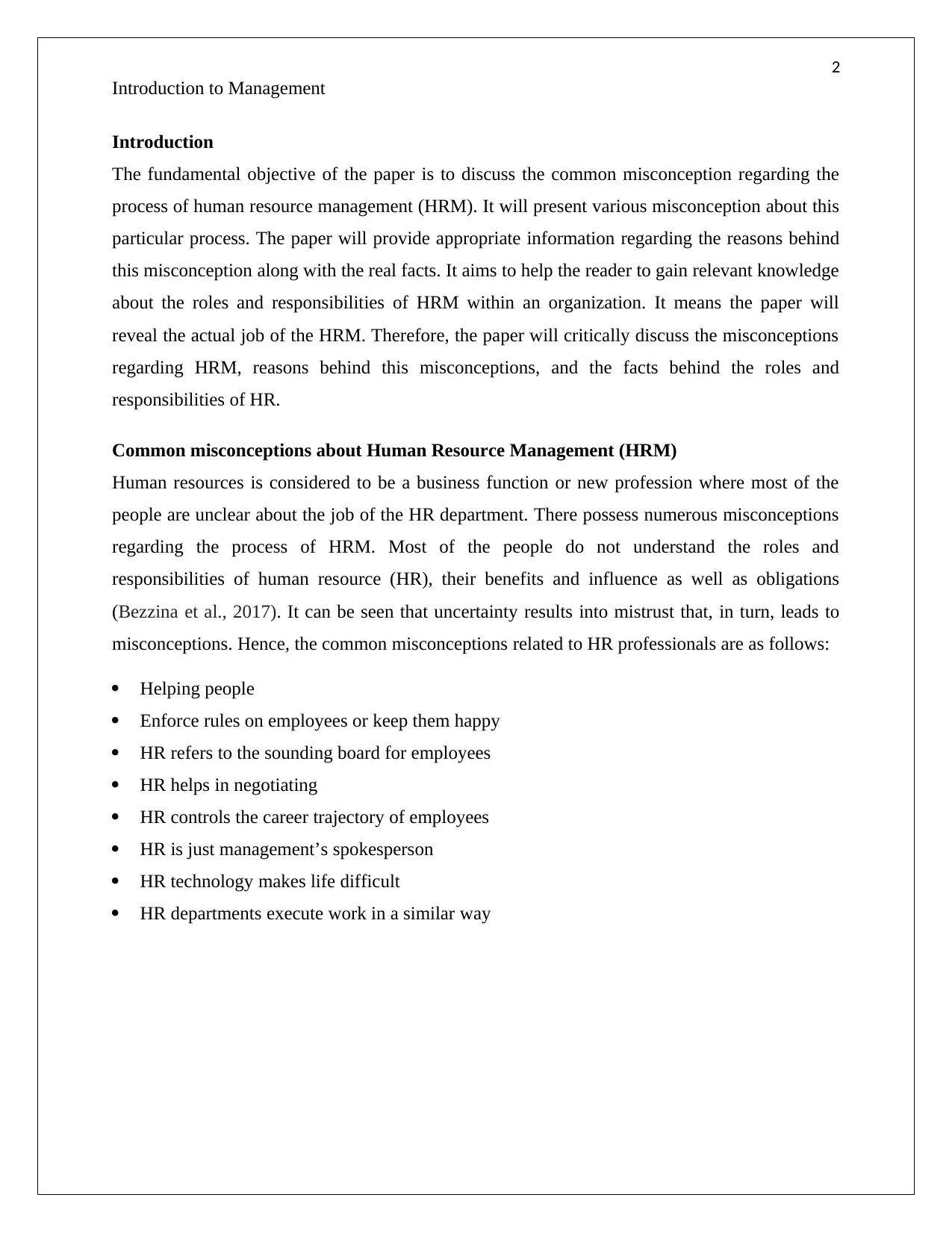
2
Introduction to Management
Introduction
The fundamental objective of the paper is to discuss the common misconception regarding the
process of human resource management (HRM). It will present various misconception about this
particular process. The paper will provide appropriate information regarding the reasons behind
this misconception along with the real facts. It aims to help the reader to gain relevant knowledge
about the roles and responsibilities of HRM within an organization. It means the paper will
reveal the actual job of the HRM. Therefore, the paper will critically discuss the misconceptions
regarding HRM, reasons behind this misconceptions, and the facts behind the roles and
responsibilities of HR.
Common misconceptions about Human Resource Management (HRM)
Human resources is considered to be a business function or new profession where most of the
people are unclear about the job of the HR department. There possess numerous misconceptions
regarding the process of HRM. Most of the people do not understand the roles and
responsibilities of human resource (HR), their benefits and influence as well as obligations
(Bezzina et al., 2017). It can be seen that uncertainty results into mistrust that, in turn, leads to
misconceptions. Hence, the common misconceptions related to HR professionals are as follows:
Helping people
Enforce rules on employees or keep them happy
HR refers to the sounding board for employees
HR helps in negotiating
HR controls the career trajectory of employees
HR is just management’s spokesperson
HR technology makes life difficult
HR departments execute work in a similar way
Introduction to Management
Introduction
The fundamental objective of the paper is to discuss the common misconception regarding the
process of human resource management (HRM). It will present various misconception about this
particular process. The paper will provide appropriate information regarding the reasons behind
this misconception along with the real facts. It aims to help the reader to gain relevant knowledge
about the roles and responsibilities of HRM within an organization. It means the paper will
reveal the actual job of the HRM. Therefore, the paper will critically discuss the misconceptions
regarding HRM, reasons behind this misconceptions, and the facts behind the roles and
responsibilities of HR.
Common misconceptions about Human Resource Management (HRM)
Human resources is considered to be a business function or new profession where most of the
people are unclear about the job of the HR department. There possess numerous misconceptions
regarding the process of HRM. Most of the people do not understand the roles and
responsibilities of human resource (HR), their benefits and influence as well as obligations
(Bezzina et al., 2017). It can be seen that uncertainty results into mistrust that, in turn, leads to
misconceptions. Hence, the common misconceptions related to HR professionals are as follows:
Helping people
Enforce rules on employees or keep them happy
HR refers to the sounding board for employees
HR helps in negotiating
HR controls the career trajectory of employees
HR is just management’s spokesperson
HR technology makes life difficult
HR departments execute work in a similar way
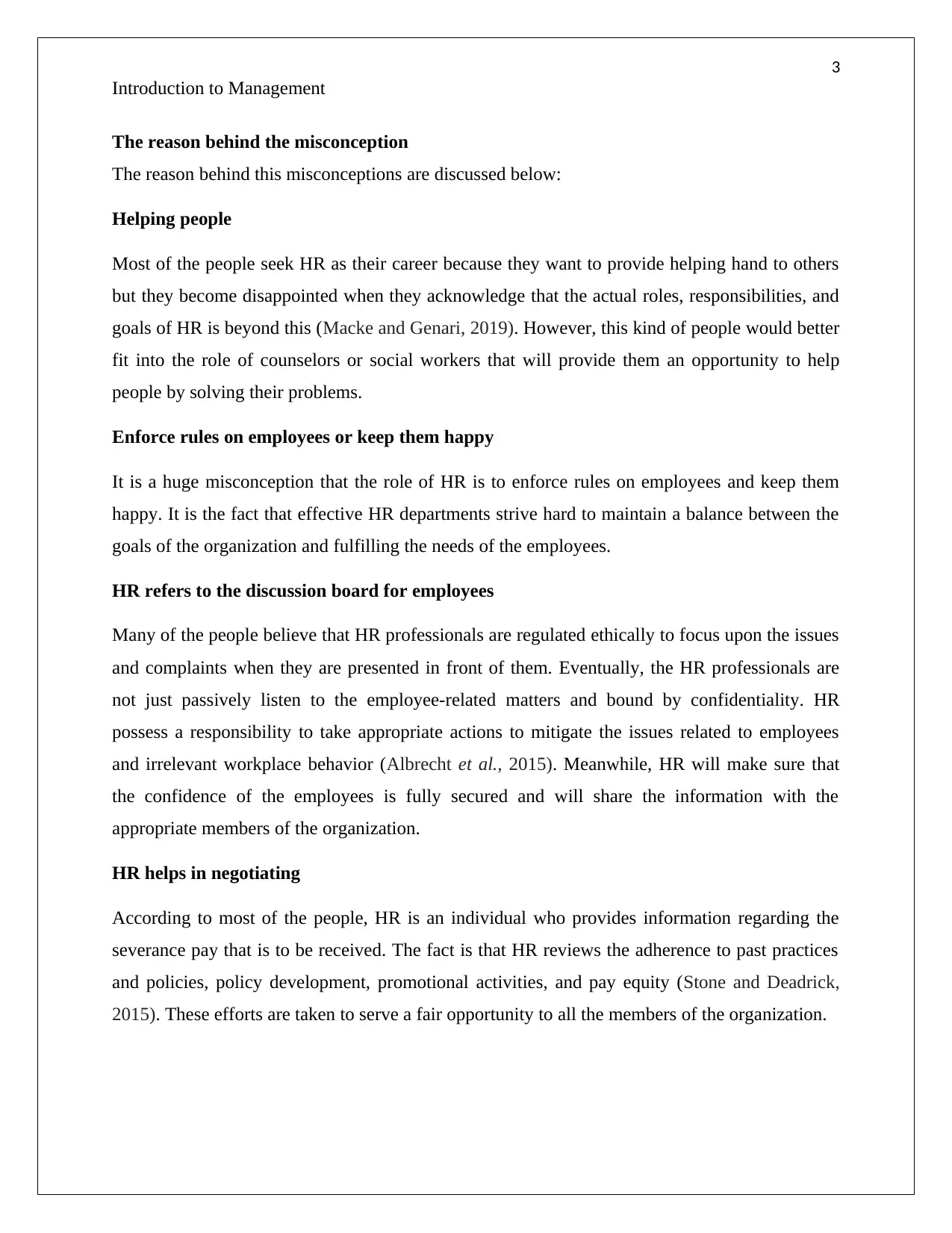
3
Introduction to Management
The reason behind the misconception
The reason behind this misconceptions are discussed below:
Helping people
Most of the people seek HR as their career because they want to provide helping hand to others
but they become disappointed when they acknowledge that the actual roles, responsibilities, and
goals of HR is beyond this (Macke and Genari, 2019). However, this kind of people would better
fit into the role of counselors or social workers that will provide them an opportunity to help
people by solving their problems.
Enforce rules on employees or keep them happy
It is a huge misconception that the role of HR is to enforce rules on employees and keep them
happy. It is the fact that effective HR departments strive hard to maintain a balance between the
goals of the organization and fulfilling the needs of the employees.
HR refers to the discussion board for employees
Many of the people believe that HR professionals are regulated ethically to focus upon the issues
and complaints when they are presented in front of them. Eventually, the HR professionals are
not just passively listen to the employee-related matters and bound by confidentiality. HR
possess a responsibility to take appropriate actions to mitigate the issues related to employees
and irrelevant workplace behavior (Albrecht et al., 2015). Meanwhile, HR will make sure that
the confidence of the employees is fully secured and will share the information with the
appropriate members of the organization.
HR helps in negotiating
According to most of the people, HR is an individual who provides information regarding the
severance pay that is to be received. The fact is that HR reviews the adherence to past practices
and policies, policy development, promotional activities, and pay equity (Stone and Deadrick,
2015). These efforts are taken to serve a fair opportunity to all the members of the organization.
Introduction to Management
The reason behind the misconception
The reason behind this misconceptions are discussed below:
Helping people
Most of the people seek HR as their career because they want to provide helping hand to others
but they become disappointed when they acknowledge that the actual roles, responsibilities, and
goals of HR is beyond this (Macke and Genari, 2019). However, this kind of people would better
fit into the role of counselors or social workers that will provide them an opportunity to help
people by solving their problems.
Enforce rules on employees or keep them happy
It is a huge misconception that the role of HR is to enforce rules on employees and keep them
happy. It is the fact that effective HR departments strive hard to maintain a balance between the
goals of the organization and fulfilling the needs of the employees.
HR refers to the discussion board for employees
Many of the people believe that HR professionals are regulated ethically to focus upon the issues
and complaints when they are presented in front of them. Eventually, the HR professionals are
not just passively listen to the employee-related matters and bound by confidentiality. HR
possess a responsibility to take appropriate actions to mitigate the issues related to employees
and irrelevant workplace behavior (Albrecht et al., 2015). Meanwhile, HR will make sure that
the confidence of the employees is fully secured and will share the information with the
appropriate members of the organization.
HR helps in negotiating
According to most of the people, HR is an individual who provides information regarding the
severance pay that is to be received. The fact is that HR reviews the adherence to past practices
and policies, policy development, promotional activities, and pay equity (Stone and Deadrick,
2015). These efforts are taken to serve a fair opportunity to all the members of the organization.
Secure Best Marks with AI Grader
Need help grading? Try our AI Grader for instant feedback on your assignments.
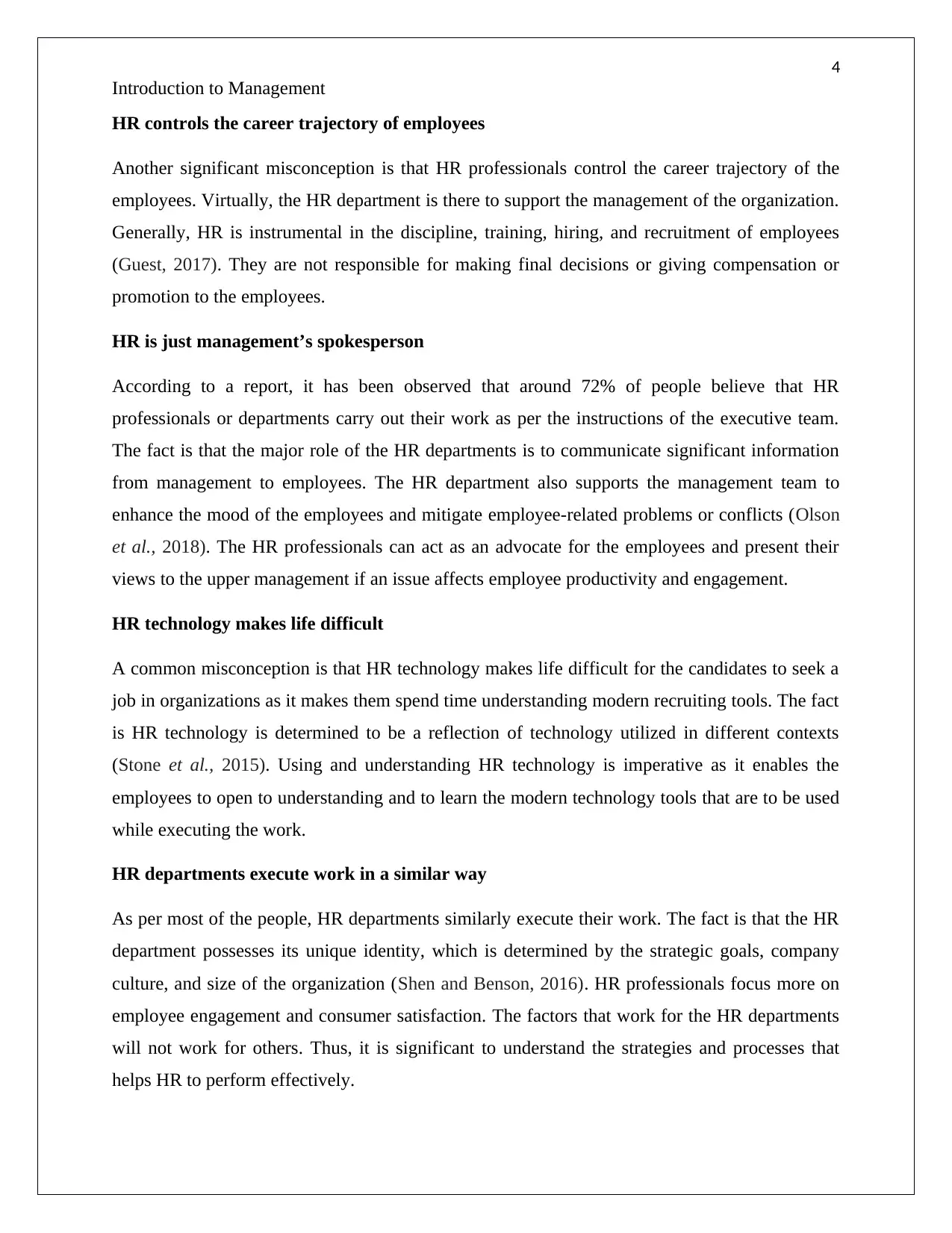
4
Introduction to Management
HR controls the career trajectory of employees
Another significant misconception is that HR professionals control the career trajectory of the
employees. Virtually, the HR department is there to support the management of the organization.
Generally, HR is instrumental in the discipline, training, hiring, and recruitment of employees
(Guest, 2017). They are not responsible for making final decisions or giving compensation or
promotion to the employees.
HR is just management’s spokesperson
According to a report, it has been observed that around 72% of people believe that HR
professionals or departments carry out their work as per the instructions of the executive team.
The fact is that the major role of the HR departments is to communicate significant information
from management to employees. The HR department also supports the management team to
enhance the mood of the employees and mitigate employee-related problems or conflicts (Olson
et al., 2018). The HR professionals can act as an advocate for the employees and present their
views to the upper management if an issue affects employee productivity and engagement.
HR technology makes life difficult
A common misconception is that HR technology makes life difficult for the candidates to seek a
job in organizations as it makes them spend time understanding modern recruiting tools. The fact
is HR technology is determined to be a reflection of technology utilized in different contexts
(Stone et al., 2015). Using and understanding HR technology is imperative as it enables the
employees to open to understanding and to learn the modern technology tools that are to be used
while executing the work.
HR departments execute work in a similar way
As per most of the people, HR departments similarly execute their work. The fact is that the HR
department possesses its unique identity, which is determined by the strategic goals, company
culture, and size of the organization (Shen and Benson, 2016). HR professionals focus more on
employee engagement and consumer satisfaction. The factors that work for the HR departments
will not work for others. Thus, it is significant to understand the strategies and processes that
helps HR to perform effectively.
Introduction to Management
HR controls the career trajectory of employees
Another significant misconception is that HR professionals control the career trajectory of the
employees. Virtually, the HR department is there to support the management of the organization.
Generally, HR is instrumental in the discipline, training, hiring, and recruitment of employees
(Guest, 2017). They are not responsible for making final decisions or giving compensation or
promotion to the employees.
HR is just management’s spokesperson
According to a report, it has been observed that around 72% of people believe that HR
professionals or departments carry out their work as per the instructions of the executive team.
The fact is that the major role of the HR departments is to communicate significant information
from management to employees. The HR department also supports the management team to
enhance the mood of the employees and mitigate employee-related problems or conflicts (Olson
et al., 2018). The HR professionals can act as an advocate for the employees and present their
views to the upper management if an issue affects employee productivity and engagement.
HR technology makes life difficult
A common misconception is that HR technology makes life difficult for the candidates to seek a
job in organizations as it makes them spend time understanding modern recruiting tools. The fact
is HR technology is determined to be a reflection of technology utilized in different contexts
(Stone et al., 2015). Using and understanding HR technology is imperative as it enables the
employees to open to understanding and to learn the modern technology tools that are to be used
while executing the work.
HR departments execute work in a similar way
As per most of the people, HR departments similarly execute their work. The fact is that the HR
department possesses its unique identity, which is determined by the strategic goals, company
culture, and size of the organization (Shen and Benson, 2016). HR professionals focus more on
employee engagement and consumer satisfaction. The factors that work for the HR departments
will not work for others. Thus, it is significant to understand the strategies and processes that
helps HR to perform effectively.
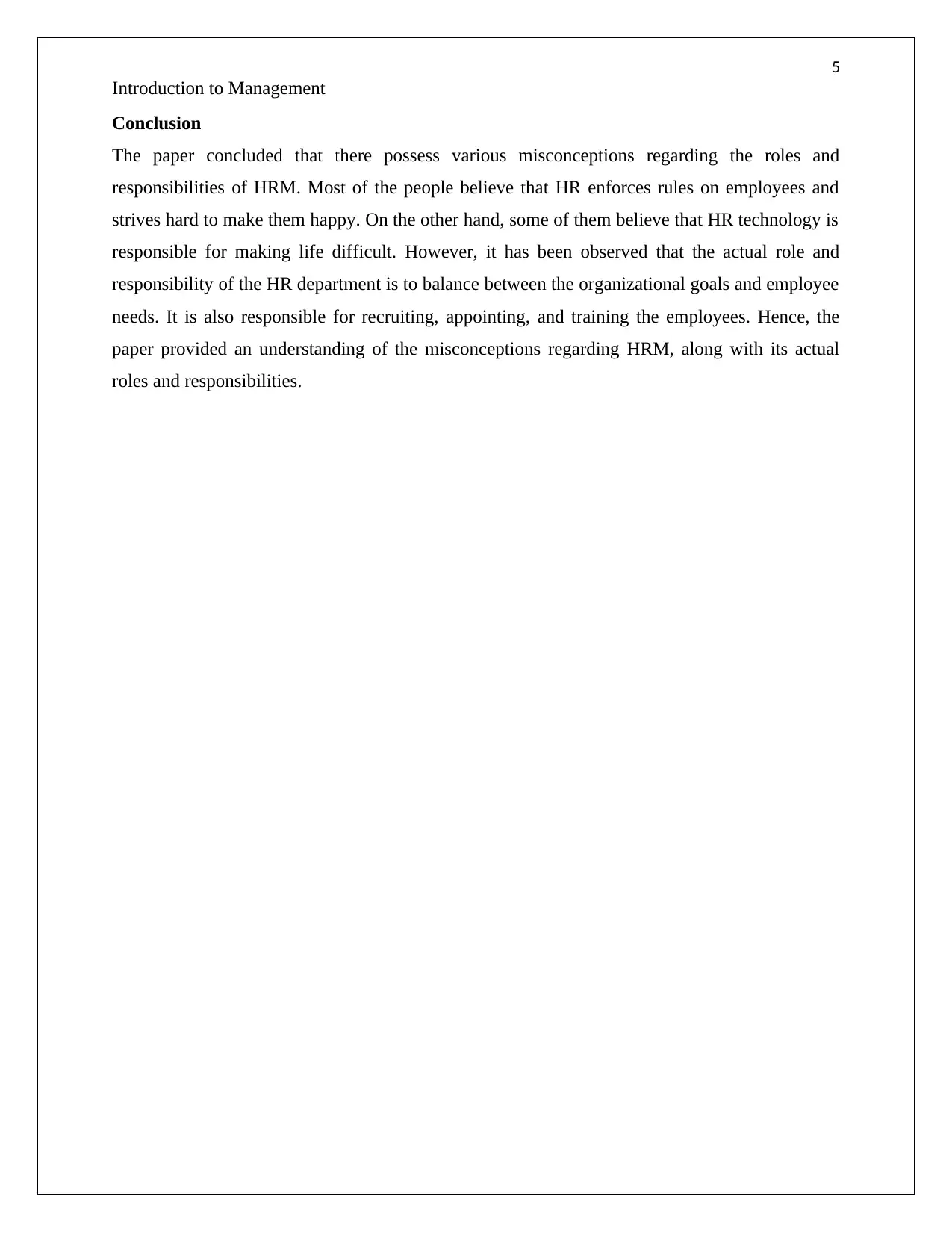
5
Introduction to Management
Conclusion
The paper concluded that there possess various misconceptions regarding the roles and
responsibilities of HRM. Most of the people believe that HR enforces rules on employees and
strives hard to make them happy. On the other hand, some of them believe that HR technology is
responsible for making life difficult. However, it has been observed that the actual role and
responsibility of the HR department is to balance between the organizational goals and employee
needs. It is also responsible for recruiting, appointing, and training the employees. Hence, the
paper provided an understanding of the misconceptions regarding HRM, along with its actual
roles and responsibilities.
Introduction to Management
Conclusion
The paper concluded that there possess various misconceptions regarding the roles and
responsibilities of HRM. Most of the people believe that HR enforces rules on employees and
strives hard to make them happy. On the other hand, some of them believe that HR technology is
responsible for making life difficult. However, it has been observed that the actual role and
responsibility of the HR department is to balance between the organizational goals and employee
needs. It is also responsible for recruiting, appointing, and training the employees. Hence, the
paper provided an understanding of the misconceptions regarding HRM, along with its actual
roles and responsibilities.
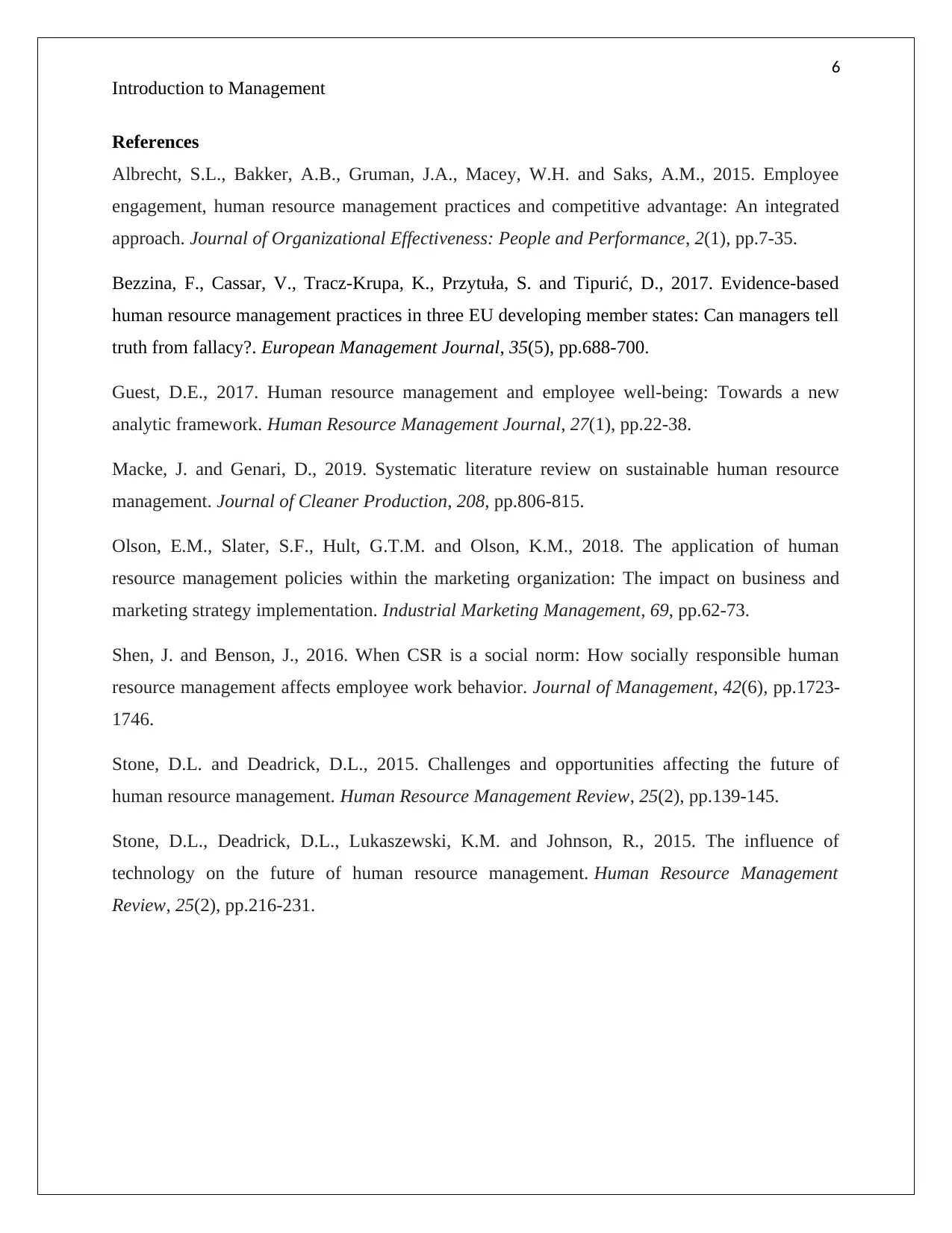
6
Introduction to Management
References
Albrecht, S.L., Bakker, A.B., Gruman, J.A., Macey, W.H. and Saks, A.M., 2015. Employee
engagement, human resource management practices and competitive advantage: An integrated
approach. Journal of Organizational Effectiveness: People and Performance, 2(1), pp.7-35.
Bezzina, F., Cassar, V., Tracz-Krupa, K., Przytuła, S. and Tipurić, D., 2017. Evidence-based
human resource management practices in three EU developing member states: Can managers tell
truth from fallacy?. European Management Journal, 35(5), pp.688-700.
Guest, D.E., 2017. Human resource management and employee well‐being: Towards a new
analytic framework. Human Resource Management Journal, 27(1), pp.22-38.
Macke, J. and Genari, D., 2019. Systematic literature review on sustainable human resource
management. Journal of Cleaner Production, 208, pp.806-815.
Olson, E.M., Slater, S.F., Hult, G.T.M. and Olson, K.M., 2018. The application of human
resource management policies within the marketing organization: The impact on business and
marketing strategy implementation. Industrial Marketing Management, 69, pp.62-73.
Shen, J. and Benson, J., 2016. When CSR is a social norm: How socially responsible human
resource management affects employee work behavior. Journal of Management, 42(6), pp.1723-
1746.
Stone, D.L. and Deadrick, D.L., 2015. Challenges and opportunities affecting the future of
human resource management. Human Resource Management Review, 25(2), pp.139-145.
Stone, D.L., Deadrick, D.L., Lukaszewski, K.M. and Johnson, R., 2015. The influence of
technology on the future of human resource management. Human Resource Management
Review, 25(2), pp.216-231.
Introduction to Management
References
Albrecht, S.L., Bakker, A.B., Gruman, J.A., Macey, W.H. and Saks, A.M., 2015. Employee
engagement, human resource management practices and competitive advantage: An integrated
approach. Journal of Organizational Effectiveness: People and Performance, 2(1), pp.7-35.
Bezzina, F., Cassar, V., Tracz-Krupa, K., Przytuła, S. and Tipurić, D., 2017. Evidence-based
human resource management practices in three EU developing member states: Can managers tell
truth from fallacy?. European Management Journal, 35(5), pp.688-700.
Guest, D.E., 2017. Human resource management and employee well‐being: Towards a new
analytic framework. Human Resource Management Journal, 27(1), pp.22-38.
Macke, J. and Genari, D., 2019. Systematic literature review on sustainable human resource
management. Journal of Cleaner Production, 208, pp.806-815.
Olson, E.M., Slater, S.F., Hult, G.T.M. and Olson, K.M., 2018. The application of human
resource management policies within the marketing organization: The impact on business and
marketing strategy implementation. Industrial Marketing Management, 69, pp.62-73.
Shen, J. and Benson, J., 2016. When CSR is a social norm: How socially responsible human
resource management affects employee work behavior. Journal of Management, 42(6), pp.1723-
1746.
Stone, D.L. and Deadrick, D.L., 2015. Challenges and opportunities affecting the future of
human resource management. Human Resource Management Review, 25(2), pp.139-145.
Stone, D.L., Deadrick, D.L., Lukaszewski, K.M. and Johnson, R., 2015. The influence of
technology on the future of human resource management. Human Resource Management
Review, 25(2), pp.216-231.
1 out of 7
Related Documents
Your All-in-One AI-Powered Toolkit for Academic Success.
+13062052269
info@desklib.com
Available 24*7 on WhatsApp / Email
![[object Object]](/_next/static/media/star-bottom.7253800d.svg)
Unlock your academic potential
© 2024 | Zucol Services PVT LTD | All rights reserved.





